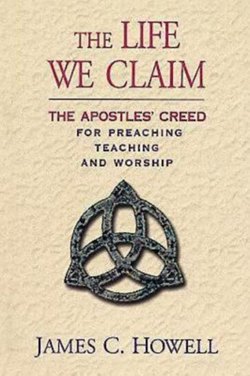Читать книгу The Life We Claim - James C. Howell - Страница 8
На сайте Литреса книга снята с продажи.
LESSON 2 DOUBT AND DOGMA
ОглавлениеThey did not understand what he was saying and were afraid
to ask. (Mark 9:32, AP)
But what if we have doubts and hard questions? Does the Apostles' Creed alienate thinkers? The Creed, in a surprising way, invites doubt. The Creed was first composed as a set of questions, and for people with plenty of questions. If we know all the answers, we forget the questions! And if Jesus did anything in his ministry, he asked far more questions than he answered. Isn't there a faithfulness in our doubting? Haven't all great discoveries in history happened because somebody doubted? We have to learn to trust our questions, to think more deeply, never to quit in our pursuit of truth, to probe the pages of the Bible, to listen to the pulse of our lives, to pray more fervently. If we think cocksure certainty is the only posture for the faithful Christian, we will wind up mean or disillusioned.
The Creed does not banish doubt so much as it offers up a hopeful frame within which to ask our questions and to grow in our love for God and our heart for serving God. A vital relationship with God is not easy; the life of faith has its dark moments, as we grasp after a God who is palpable one moment and elusive the next. We shrink before a God beyond comprehension, and yet even as we shrink, we stay, not to toy with a mere idea of God, but to flourish in a startling friendship with the living God.5
In this series, we will explore the hard questions that dog people outside (and inside) the Church. Can anyone prove there is a God? What about science and the Bible? How can God be good if there is evil? Why call God "Father"? Does it matter if Mary was a virgin? Doctrine, we might remember, is the extravagant effort of Christian thinkers to make sense out of a faith that is complex, and one that is never embarrassed by awkward questions.
We may all know fervent Christians bristling with faith who say, "Just give me Jesus." But the Creed not only gives us Jesus. In Rowan Williams's lovely words, it is "the job of doctrine . . . to hold us still before Jesus. When that slips out of view, we begin instead to use this language to defend ourselves, to denigrate others, to control and correct—and then it becomes a problem."6
Doctrine is holding us still before Jesus! So working through the Creed could never be dull or boring. The mystery writer Dorothy Sayers suggested that "it is the neglect of dogma that makes for dullness. The Christian faith is the most exciting drama that ever staggered the imagination of man—and the dogma is the drama. That drama is summarized quite clearly in the Creeds."7 And the excitement of the drama played out in the Creed is never just a mind game; the Creed issues in a radically altered life, as we will see in each chapter of this book. Sayers, grousing about the demise of Christianity in Great Britain a half century ago, may have prophesied where we have wound up in America:
It is worse than useless for Christians to talk about the importance of Christian morality, unless they are prepared to take their stand upon the fundamentals of Christian theology. It is fatal to let people suppose that Christianity is only a mode of feeling. . . . And it is fatal to imagine that everybody knows quite well what Christianity is and needs only a little encouragement to practice it. The brutal fact is that in this Christian country not one person in a hundred has the faintest notion what the Church teaches about God or man or society or the person of Jesus Christ.8
We want to be sure we at least are clear about what the Church teaches and about the true nature of morality. If we look closely into the nooks and crannies of the Creed, we will be drawn into a scintillating, changed life together.
